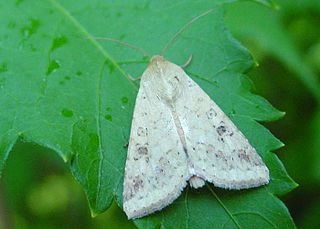
Helicoverpa armigera is a species of Lepidoptera in the family Noctuidae. It is known as the cotton bollworm, corn earworm, Old World (African) bollworm, or scarce bordered straw. The larvae feed on a wide range of plants, including many important cultivated crops. It is a major pest in cotton and one of the most polyphagous and cosmopolitan pest species. It should not be confused with the similarly named larva of the related species Helicoverpa zea.

Grevillea armigera, also known as prickly toothbrushes or thorny grevillea, is a species of flowering plant in the family Proteaceae and is endemic to the south-west of Western Australia. It is an erect to spreading shrub with deeply-lobed leaves, the lobes linear and sharply pointed, and grey, green or pale yellow flowers with black to maroon styles.

Helicoverpa is a genus of moths in the family Noctuidae first described by David F. Hardwick in 1965. Some species are among the worst Lepidopteran agricultural pests in the world, and three species migrate long distances both with and without human transportation, mixing resistance alleles along the way.
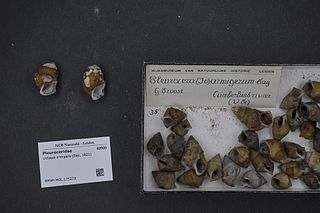
The armigerous river snail or armored rocksnail, scientific name Lithasia armigera, is a species of freshwater snail with an operculum, an aquatic gastropod mollusk in the family Pleuroceridae. This species is endemic to the United States.
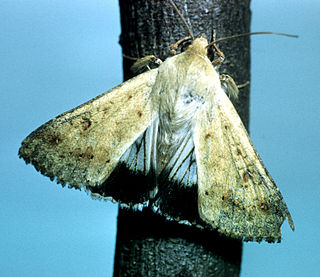
Helicoverpa punctigera, the native budworm, Australian bollworm or Chloridea marmada, is a species of moth in the family Noctuidae. This species is native to Australia. H. punctigera are capable of long-distance migration from their inland Australian habitat towards coastal regions and are an occasional migrant to New Zealand.
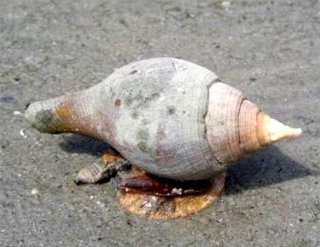
Turbinella is a genus of very large sea snails with an operculum, marine gastropod mollusks in the subfamily Turbinellinae of the family Turbinellidae.

Heliothinae is a small, cosmopolitan subfamily of moths in the family Noctuidae, with about 400 described species worldwide. It includes a number of economically significant agricultural pest species, such as Helicoverpa armigera and Helicoverpa zea.

Stramonita is a genus of predatory sea snails, marine gastropod molluscs in the subfamily Rapaninae of the family Muricidae, the rock snails.

Reishia is a genus of sea snails, marine gastropod mollusks in the family Muricidae, the murex snails or rock snails.
T. armigera may refer to:

Cajanus scarabaeoides is a flowering plant in the genus Cajanus. Of the 32 different species within the genus Cajanus, only one, C. cajan (pigeonpea), is cultivated. Cajanus scarabaeoides is the closest wild relative to C. cajan, and is one of the easiest wild species to cross with pigeonpea cultivars. C. scarabaeoides is found naturally in both temperate and tropical zones around the globe. This species has higher levels of drought tolerance, is found to have greater protein content, and has higher levels of resistance to insect pests compared to cultivated types. These genetic traits can be crossed with C. cajan to improve the crop's productivity. For subsistence farmers, this can reduce economic losses and drastically improve overall crop yield.

Anasa armigera, the horned squash bug, is a species of leaf-footed bug in the family Coreidae. It is found in North America.
Acanthocheila armigera is a species of lace bug in the family Tingidae. It is found in the Caribbean Sea, Central America, North America, and South America.

Mancinella armigera is a species of sea snail, a marine gastropod, in the family Muricidae, the murex snails or rock snails. The species name means “bearing arms”.
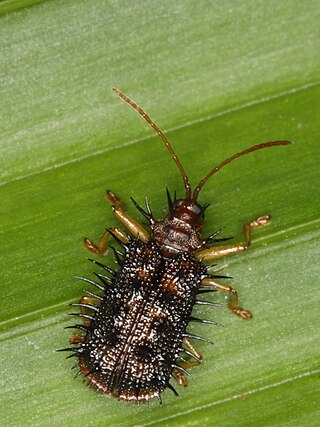
Dicladispa armigera is a species of leaf beetle from Southeast Asia, often known by its common name: the "rice hispa". These beetles are a well known invasive pest, and are responsible for significant crop damage across many countries. The male to female ratio is between 1:1.26 and 1:1.46.
Planorbula is a genus of gastropods belonging to the family Planorbidae.











